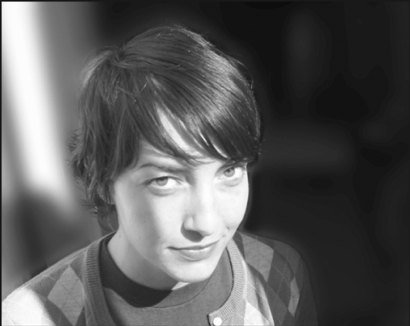By Bonnie Rosenstock
“Like Son,” Felicia Luna Lemus’ second novel, is a contemporary love story about legacies and identity, which spans seven years of the near present with frequent flashes to the past. The protagonist and narrator, Frank Cruz, born Francisca, has pain to deal with in all time continuums. When his estranged father, who is dying of cancer, bequeaths Frank a fading black and white photograph of Nahui Olin, an all but forgotten figure in the Mexican avant-garde of the 1920s, and a key to a safe deposit box, Frank sets out on a journey of self-discovery which takes him from the lonely stretches of desolate highway and sweeping Southern California hills to the concrete confines of the East Village.
“I am interested in the way people are trying to accept or reject what they have inherited, whether societal, gender, [or] cultural,” explained Lemus, 32. “Like Frank is trying to figure out which parts of his cultural legacy, familial legacy and personal experiences he is trying to hold onto and which parts he’s trying to disassociate himself from.”
The romantic texture revolves around Frank’s relationship with the unpredictable, seemingly carefree Natalie with whom he lives at 150 East 7th Street between A and B. Lemus explores the way Frank inherited his father’s tendency towards complicated, yet nuanced pairings. “I worked on making Frank and Natalie’s relationship kind and loving, but also complicated and frustrating. Just like every couple,” she said knowingly. “Frank is the steady one. They operate in a bit of extremes, but they balance each other out by being together. I don’t know if they finally figure it out,” she admitted.
Frank’s fascination with the larger-than-life Olin mirrors Lemus’. “The fact that her [adopted] name means Earthquake Sun, which translates from Náhuatl [an Aztec language] into Apocalypse, how fantastically hot is that?” she exclaimed.
In the novel it is suggested that the historical Olin, a poet, painter, artists’ model and muse, had an affair with Frank’s grandmother. “Obviously, that didn’t happen because Frank’s a fictional character,” she explained. “I was so carefully trained by really ethical historians as an undergraduate that I have this problem letting myself take an historical figure and imposing any experience, behavior or personality trait that I can’t imagine them having,” she stated.
Lemus discovered Olin in a local newspaper in her native Orange County, California. At first, she thought it was a cool girl band coming to town. In fact, the picture of the fiery, green-eyed bohemian beauty was taken by Edward Weston in 1924, and was publicizing a gallery exhibit in Laguna Beach. “I went to the exhibit, saw her photo and began writing vignettes. I couldn’t stop. I had no idea that I was going to end up writing. I thought I would be in a teaching program or academia, but as a result I wound up in graduate school where I wrote my first novel,” she said.
After finishing “Trace Elements of Random Tea Parties,” published in 2003, Lemus returned to Olin. “Clearly this was an historical figure that wasn’t going to leave me alone until I found a way to incorporate her centrally into a novel,” she said. “I love her so completely.”
Lemus, who is queer by her own definition, is an attractive, engaging Mexican-American. She has been living in the East Village for the past three years, the last two with author T Cooper. The description of Tompkins Square Park from Frank’s apartment window, which is his sliver of greenery in an otherwise colorless world, is one she knows very well. It was the view from her first apartment. “Since I was still getting to know New York, it was a particular physical position (looking out that particular window) that I could explain accurately,” she said.
Although Frank is transgender, Lemus’ book doesn’t focus on it; she had already written a coming-of-age experience in her first novel. “Frank sees the world as a straight man. I wanted to write a story that wasn’t about his coming out or his transition, but more about his experiences as a human that focused on his relationship with his family and love life. By the end of the story, I tried to create a situation where his father would be proud of him, where he could really be his father’s son,” she said.
Lemus also teaches fiction writing at the New School, which is a pleasant change of scene. “Writing can be so isolating,” she admitted. “It’s nice to be able to talk with people about books and writing forms and to get outside of my head at least once a week.”
For her next novel, Lemus is kicking around ideas about the cable channel QVC, where viewers can buy anything, and the Home Shopping Network. “QVC is really creepy, uncanny and twisted. It’s so culturally wrong, so of course I’m drawn to it,” she said with an impish laugh.


































